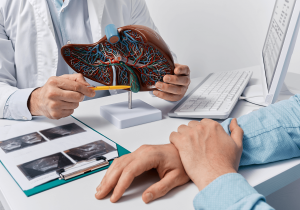
Defining the functions of the liver
The liver is no ordinary organ. While most other organs only have a couple of roles, the liver carries out more than 500 functions that are essential for good health. You may have heard the liver discussed in mentions of detox diets and cleanses because one of the main functions of the liver in digestion is removing toxins and waste from the body. But this extraordinary organ does so much more than that. So, take a closer look to examine the primary functions of the liver and why it’s so important, as well as the diseases that can cause damage. Then, uncover answers to your questions about how does the liver work and get tips to keep it working well and you feeling well.
Why the liver is vital
One of the many reasons that the liver is a big deal is because it’s a big organ. It weighs a whopping three pounds, which may not sound like much, but the only organ heavier and larger than the liver is your skin. The liver is located on the right side of your body, just below your lungs. It’s so large that it fills up most of your rib cage and some of your upper abdomen. Another reason why the liver is no ordinary organ is because it actually has the ability to regenerate and repair itself when it becomes damaged, but only if you keep it healthy. To understand how the liver works, it helps to know the primary functions of the liver to see how hard it works to keep you healthy.
Reasons to love your liver
The liver is a multi-tasking marvel that does everything from filtering toxins to storing nutrients. Among its more than 500 functions, most of the tasks focus on the primary functions of the liver, which are filtration, digestion, metabolism, protein synthesis, and nutrient storage. Within the primary functions of the liver, the roles the liver works to perform include:
- Producing bile, which is one of the main functions of the liver in digestion and helps with the breakdown and digestion of fats.
- Breaking down and removing waste, toxins, and other harmful substances to help detoxify the body.
- Filtering the blood to remove hormones, alcohol, and drugs.
- Metabolizing proteins, carbohydrates, and fats.
- Absorbing iron.
- Storing vitamins and minerals.
- Regulating blood clotting.
- Helping to fight infections.
When the liver breaks down
With the many complex tasks involved in the primary functions of the liver, you can experience problems over time. Picture your liver as an elastic band that can only stretch to a certain point before it develops damage or disease. Problems that affect the liver are known as hepatic conditions. The most common hepatic conditions are hepatitis, cirrhosis, alcoholic liver disease, fatty liver disease, and liver cancer. These hepatic conditions can have a major impact on how the liver works and your overall health. Some hepatic conditions don’t have any symptoms, but when they do, the most common signs include jaundice, stomach pain, bruising easily, fatigue, and swelling in your arms or legs. If you experience any of these symptoms, schedule an appointment with your CarolinaMD-affiliated doctor.
10 ways to show your liver some love
Understanding everything involved in how the liver works, you should do everything you can to keep it working well. After all, the best way to fight liver disease is to avoid it altogether by keeping your liver healthy with these liver-loving habits:
- Eating a balanced diet of lean proteins, whole grains, fruits, vegetables, and healthy fats.
- Exercising on a regular basis.
- Limiting your alcohol consumption.
- Quitting smoking.
- Avoiding the use of illicit drugs and contaminated needles.
- Following directions very carefully when taking all medications, and never mixing medicines with alcohol or other prescription drugs.
- Getting the necessary vaccines when you travel.
- Wearing a mask when you’re around toxic chemicals.
- Practicing safe sex.
- Getting medical care immediately if you’re exposed to blood.
Your liver works hard for you, but it’s easy to take it for granted. By loving your liver and keeping it healthy, you will love what your liver does for you for many years to come.